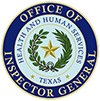Providers encouraged to self-report billing errors
Providers who identify errors in claims have an avenue to voluntarily disclose mistakes to the OIG and work with the agency to correct claims for Medicaid and other Texas Health and Human Services programs. The self-report process allows the OIG to develop partnerships with providers while reducing fraud, waste and abuse. In addition, providers who self-disclose can also reduce their legal and financial exposure while working with the OIG to understand the audit and investigatory processes better.
The process
Providers can contact the OIG to report various program violations, including billing errors, services not rendered, or hiring excluded individuals. The resolution for each issue will vary. However, providers who discover improper payments must return the funding to the state by notifying the OIG and providing documentation that shows the discrepancy. OIG program and policy experts will review the provided data to confirm if a violation occurred and assess what if any, amount should be returned to the state. Providers can avoid prolonged investigation and litigation and the associated costs by self-disclosing.
The benefits
The OIG is not bound by any findings submitted by the provider and may conduct additional documentation reviews while investigating the issue. However, participation in the self-disclosure process can be considered in determining enforcement measures. The self-report process is open to all providers, and the OIG Chief Counsel division will work with those who self-report, whether their issues result from simple calculation errors or intentional fraudulent activities. Additionally, a provider's cooperation with the OIG will be communicated to any county, state or federal authorities seeking additional civil or criminal enforcement.
The specific resolution of self-disclosures depends upon the individual merits of each case. Still, the OIG may extend the following benefits to providers who initiate a good-faith self-disclosure:
- Forgiveness or reduction of interest payments (for up to two years).
- Extended repayment terms.
- Waiver of penalties or sanctions.
- Timely resolution of the overpayment.
- Recognition of the effectiveness of the provider's compliance program and a decrease in the likelihood of imposition of an OIG Corporate Integrity Agreement.
To report
Providers and managed care organizations may use the OIG Fraud Hotline (800-436-6184) or website, ReportTexasFraud.com, at any time to report compliance or overpayment matters relating to themselves. Additional information about the self-disclosure process and a checklist of information to include can be found in the Resources section of the OIG website.

